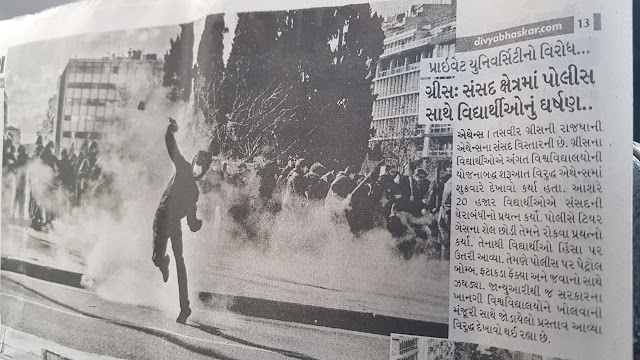This blog is crafted in response to the thinking activity assigned by Dr. Dilip Barad, Department of English, MKBU. Here, I will try to explore the questions that are provided to examine by us.
Before delving into the exploration of the questions, let’s have an introduction to the novel ‘Revolution Twenty20’ and its writer Chetan Bhagat.
🔷 Chetan Bhagat:
Chetan Bhagat, born on April 22, 1974, is an influential Indian author, columnist, and YouTuber. He gained recognition when Time magazine listed him among the World's 100 Most Influential People in 2010. Bhagat's upbringing was in a traditional Punjabi Hindu family, with his father serving in the Indian Army and his mother as a scientist.
After completing a B.Tech. in Mechanical Engineering from the Indian Institute of Technology, Delhi, in 1995, Bhagat pursued a Master of Business Administration (MBA) in marketing from the Indian Institute of Management, Ahmedabad (IIMA), graduating in 1997. He initially worked in the banking sector, including roles at Goldman Sachs and Deutsche Bank, before transitioning to a full-time writing career in 2009.
Bhagat's writing journey began with his debut novel, "Five Point Someone," written while he was working at Goldman Sachs. This novel and several subsequent ones, including "One Night @ the Call Center," "The 3 Mistakes of My Life," and "2 States," were well-received and adapted into successful Bollywood films. His later novels, such as "Revolution 2020," "Half Girlfriend," "One Indian Girl," "The Girl in Room 105," "One Arranged Murder," and "400 Days," continued to be bestsellers.
Apart from his literary career, Bhagat has a screen presence, having served as a celebrity judge on the dance reality show "Nach Baliye" season 7 and appeared in Netflix's series "Decoupled." He has also ventured into YouTube, running a channel offering motivational tips, and launched the podcast "Deeptalk with Chetan Bhagat."
As a screenwriter, Bhagat contributed to the screenplay of the film "Kai Po Che!," based on his novel "The 3 Mistakes of My Life," which won the Filmfare Award for Best Screenplay.
Five of Chetan Bhagat's novels have been adapted into successful films: "Hello," "3 Idiots," "Kai Po Che!," "2 States," and "Half Girlfriend."
Chetan Bhagat's novels have garnered immense popularity among the youth in India due to their focus on themes that resonate with this demographic. By exploring elements such as College Life and Education, Love and Relationships, Social Issues, Aspirations and Ambitions, Cultural Diversity, Corruption and Politics, Self-Discovery and Identity, and infusing his narratives with Humor and Satire, Bhagat crafts stories that captivate and engage his readers. It is the blend of relatable themes and entertaining storytelling that contributes to the consistent success of his works, making them bestsellers among the diverse and dynamic audience of young readers in India. (Wikipedia)
🔷 Revolution Twenty20:
“Once upon a time, in small-town India, there lived two intelligent boys.
One wanted to use his intelligence to make money.
One wanted to use his intelligence to start a revolution.
The problem was, they both loved the same girl.”
"Revolution 2020: Love, Corruption, Ambition," is a novel penned by Chetan Bhagat in 2011, which weaves a tale of a love triangle, corruption, and a transformative journey of self-discovery. The narrative delves into the exploitation of aspiring engineering students by private coaching institutions and the sacrifices parents make, investing their life savings to secure their children's success in competitive exams. While some achieve their dreams, others face devastating consequences.
The novel is set in Varanasi and Kota, spanning the years from 1996 to 2011. Gopal, the central character, evolves from a 10-year-old schoolboy to a 26-year-old director of Ganga Tech College.
The novel is rooted in the pervasive corruption within the Indian educational system. Varanasi was chosen as the setting due to the author's personal connection to the city and its juxtaposition of ancient traditions with modern aspirations. Reflecting on the choice, Bhagat remarked, "It is one of our oldest cities, and people there now have modern aspirations. I thought the contrast would be interesting. The city also has a lot of character."
🔷1) Social realism of corruption in the private education system
LPG and Privatization of Education in India:
The broader context of LPG (Liberalization, Privatization, and Globalization) in India, as outlined in the early 1990s, forms the backdrop for the privatization of higher education.
The article “Emerging Trends of Privatization of Education in India.” though does not directly discuss corruption in education due to privatization in India.
It Mentions the growth of "mushroom colleges" that have become centers for selling degrees without requiring students to attend classes, leading to employers getting low-wage workers. Abrol also Suggests that the over-commercialization of education is ignoring quality improvement, implying a profit motive over educational standards in some private institutions. She States that in many private institutions, there is no freedom for innovation in teaching as teachers have to follow the management's rules, some of whom are unqualified. The lack of quality controls and regulations has allowed growth of private institutions focused on quantity over quality of education and Raises concerns about private training colleges exploiting teacher salaries and status if not monitored properly by regulatory bodies.
While she does not talk explicitly about corruption, these points highlight some of the issues like profit motives superseding quality, lack of accountability, unqualified management, and need for stronger regulations that could enable corrupt practices in the privatization of education in India.
Additionally, it is crucial to recognize that the legalization of education privatization is determined by the law. During our class discussion, Bard Sir addressed a question about students and teachers associated with private educational sectors who take pride in their roles. His response resonated with truth—those studying, working, or managing private institutions should not bear blame for any corruption within the system. Instead, the responsibility lies with national-level policies endorsing the "Privatization of Education."
This perspective aligns with a recent news report about students in Athens, Greece, vehemently opposing a parliamentary bill that aimed to permit private universities. Despite the students' protests, the bill is passed by the parliament. Once such legislation is sanctioned, the focus should shift away from attributing blame to individuals within the education system. Instead, the priority becomes the establishment of a robust regulatory body capable of monitoring and mitigating malpractices. This approach is vital to safeguard the interests of both students and teachers.
The conversation between Arti and Gopal highlights the initial flame of Raghav to be a Journalist.
'He's an idiot, What will he do?'
'Journalism; she said. "He loves it, Thats what he is meant to do. He wants to change things. He's also joined university politics.'
'Totally stupid’, I said
Raghav begins his journalistic career at Dainik News as a staff reporter, where, as per Gopal, " he often wrote about black-marketeer ration shop owners, illegally sold LPG cylinders, RTO officers taking bribes, and other routine occurrences in India." One notable instance involves his coverage of corruption within Varanasi Nagar Nigam, with the headline 'Varanasi Nagar Nigam eats, builder cheats.'
“The article said, 'Surprisingly the inappropriate approvals and the resultant illegal construction are right there in front of our eyes. Unlike other corruption cases where the wrongdoing is hidden (like the Ganga Action Plan scam), here the proof is for all to see. Farms are turned into colleges, which then flout all norms to construct as much as possible. Colleges will soon have malls next-door. Politicians, meant to protect us and prevent all this, are often the culprits. This is not all, the city has new hotels, residential towers and office buildings where the VNN has taken REVOLUTION 202 0 • 19 1 its cut. We have proof to compare the vast difference between what is allowable and what VNN approved ..’
A box next to the article listed the controversial approvals.
I read the list:
1. The V-CON apartment building, a ten-storey tower on a low-flying zone.
2. Hotel Vento, construction of which has taken over a neighborhood park.
3. Ganga Tech College - Farmland mysteriously approved. College buildings constructed beyond permissible floor space index”.
“'There's politics in organisations. He will learn to fit in,' I said.
'He doesn't want to fit in. He wants to change journalism. Give it some teeth,' Aarti said.”
In 2023, a documentary titled "While We Watched," directed by Vinay Shukla, focused on Ravish Kumar's life and career, providing insights into his contributions to journalism.
Devanshi Joshi is a Gujarati Journalist who is containing the spirit of independent media with Jamavat YouTube Cahnnel.
🔷3) Do you think that an opportunity of a good novel is wasted because the story is told from Gopal's perspective? Can it be better if narrated from Raghav or Aarti's perspective? How would it be better if it was narrated from Raghav or Aarti's perspective?
Abrol, Monika. “Emerging Trends of Privatization of Education in India.” International Journal of Educational Administration, vol. 8, no. 1, 2016, pp. 1-6. Research India Publications, https://www.ripublication.com/ijea16/ijeav8n1_01.pdf.
Bhagat, Chetan. “Chetan Bhagat.” Chetan Bhagat : Welcome to Stories, https://www.chetanbhagat.com/. Accessed 10 March 2024.
Bhagat, Chetan. “Revolution 2020.” Wikipedia, https://en.wikipedia.org/wiki/Revolution_2020. Accessed 12 March 2024.
Faleiro, Sonia, et al. “YouTube is the last bastion of unbiased journalism in India.” Rest of World, 19 December 2023, https://restofworld.org/2023/india-youtube-journalism/. Accessed 10 March 2024.
Kumar, Ravish. “Ravish Kumar Official.” YouTube, https://www.youtube.com/@ravishkumar.official. Accessed 11 March 2024.
“Newslaundry.” Newslaundry, https://www.newslaundry.com/. Accessed 11 March 2024.
Poddar, Umang. “Are YouTubers now as important as TV journalists in shaping Indian politics?” Scroll.in, 19 June 2022, https://scroll.in/article/1025983/news-and-commentary-is-exploding-on-youtube-and-indian-politicians-want-to-control-it. Accessed 11 March 2024.
Sharma, Saurabh. “Why are journalists in India turning to YouTube?” Al Jazeera Journalism Review, 2 January 2023, https://institute.aljazeera.net/en/ajr/article/2067. Accessed 9 March 2024.
Times of India. “Greek parliament approves private fo .. Read more at: http://timesofindia.indiatimes.com/articleshow/108348048.cms?utm_source=contentofinterest&utm_medium=text&utm_campaign=cppst. ” Times of India, 9 March 2024,













No comments:
Post a Comment